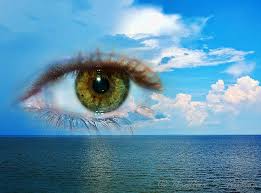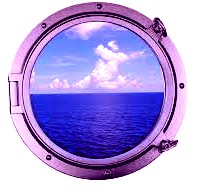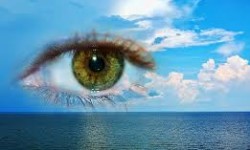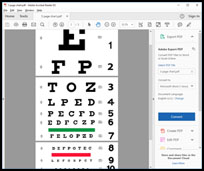When I first started studying vision improvement, and examining my own visual habits and ways of thinking, I realized I was expecting blur. Before I looked more than a few feet away, I anticipated the view being fuzzy, if not completely indecipherable. Dr. Bates wrote about using memory and imagination to help our vision, and I was using it to hold mine back. It’s as if I was telling my eyes and brain “You won’t see very well, so don’t even try to focus”. Then my obedient visual system followed this direction.

At first I didn’t understand about imagining clarity. I’d been myopic since I was a small child, and wasn’t even sure what “clarity” looked like, unless it was the sharp brittle over-focused clarity from new stronger eyeglasses, which never felt good or natural. Me, imagine clarity? You might as well ask a homeless person to imagine he lives in a palace with servants, I thought darkly. Yes, I did feel like a victim, a mindset which is not conducive to healing and growth!
It took me a while to understand that “imagining” in this context didn’t mean wishing and hoping for clarity to be bestowed on me from some fairy godmother or angel. I now know it comes from within me, after I settle my busy mind and get quiet, then visualize whatever is blurry as being clearer. If I see something blurry, I have gradually trained myself to shut my eyes, breathe deeply, then see the scene internally in as much clear detail as I can come up with. Often when I open my eyes again, the scene is clearer.

Whether you’re looking at something with your eyes open, or examining the images in your dreams, or remembering an incident from yesterday or years ago, your brain is doing the same thing. Think about that for a minute. Seeing is in the brain, not in the eyes! Memory and dreaming and open-eyed sight all exercise the same neural pathways in our brain, transforming those random colors and shapes into objects and faces we recognize, so we can make sense of our world.
When I finally stopped avoiding the dreaded eye chart (I had expected it to just tell me how poor my eyesight was), I played with this imagination technique a lot. If I couldn’t make out a letter on the chart clearly, I would close my eyes and imagine the letter I thought it was, as clearly as I could. When I opened my eyes, it was either clearer (if I had imagined the correct letter) or even more blurry if I had guessed wrong. Then it was time for another guess, and another try.
Since I’ve always had rich vivid dreams and a fertile imagination, applying this technique to vision improvement seems natural to me. What could it be that I see? Is that what it is, or that? If I don’t put any pressure on myself to “get it right”, this can be a fun game, just looking and exploring, like discovering a new world. Anything is possible, and I could spot something beautiful or fascinating at any time, if I merely look.
I wore strong glasses, then contact lenses, from age 5 into my 40s. While making many mistakes, eventually l learned how to improve the way I use my eyes and to see in a more relaxed, healthy manner. It is my pleasure to coach others to do the same. Visit me at https://NancyLNeff.com.


Thank you everyone for your input. I have been resuming the long swing and notice that I feel a bit nauseous (like car/sea sickness) while doing it. I am nonetheless not giving it up. It must be somehow linked to the eyes being fixed I presume… no idea.
I have to remind myself to be patient and go with the flow, relax, etc. and that my vision will be restored. ;D
Daniela, there’s no rush! If someone gets dizzy or nauseous from the Long Swing it is usually a sign that their eyes have been trying to fix the world in place, holding on tightly. Just go more slowly and gently. You can also try the Sway, only moving your head back and forth without moving your body, again slowly and gently. Easy does it!
Daniela may benefit more from swinging (see things moving) and giving up palming and visualization for a while.
I heard a story told of airport management recently that may help our understanding. It appears that the passengers were frustrated when getting off of the plane, because their was a risk in losing their bags; missing them, and having to wait for the second round, etc. Airport management beefed up the system some 8%. Still passengers complained. After brainstorming, they moved the baggage carousal further away from the terminal. The complaining stopped, because energy was used on the “wait”, rather than the “bags”. Waiting is the most difficult part of hope. In vision it is the same – your eyes respond when you don’t focus on them so thoroughly. They long to serve you! Just let them try, as if they were your child learning to walk. One of our children started to walk when we weren’t looking at all!
Paul, yes! Dr. Bates used to say “Forget about your eyes” which confused people. This is exactly what he meant. Don’t obsess so much over “Am I doing it right?” and “Is my eyesight getting better?” that you interfere with the natural functioning of your vision. Thanks for the instructive story.
Thanks Nancy. I so enjoy reading your posts and what a beautiful story Paul. For whatever reason I seem to be getting worse every day and I don’t understand why!! I have always had very vivid dreams and my day dreaming is also very clear yet if I close my eyes and try to imagine anything, nothing will appear in my mind’s eyes. Why??? I was asked to do this exercise in one of my visits to a Bates group in London and I simply couldn’t visualize anything! So I gave it up but I keep on trying from time to time with no success… I truly wonder what I am doing wrong and I am looking forward to the day when everything will make sense and my eyes will be relieved of this never ending strain.
Daniela, first, relax! Think of a happy memory: can you smell the ocean, or hear the seagulls, even though your body is in front of the computer screen right now? Your visual channel may be a little restricted, starting to give up from all the pressure to perform. (This is my guess and only you know if I’m right.) Just gently notice in your mind’s eye, don’t peer or stare or squint or otherwise struggle to see. Are there children playing on that imaginary beach? What colors are there? I’m thinking you’re trying too hard, not just letting it happen. Make it a game and have fun with it. Vision is a joy!
A friend in his journey of life attracted me to his practice in optometry, also looking beyond mere glasses to direct his heart service to people with vision problems. He was startled to discover that my eyes were frustrated with my focus on a quick cure for visual acuity! (I had been doing this since my teens!!) He asked me to come often, to watch it. Either I would hear the Truth, and help my eyes, or possibly go on medication the rest of my life, which neither of us wanted! At home I finally understood that I was frustrating the design of my eyes in serving my true heart. I started leaving my glasses off and enlarging print on my computer instead. (I record books for personal reflection while exercising, etc.) My eyes gradually changed!!! A transformation occurred!! My perscription changed! All of the tests came back in a safe range!!
Paul, good for you — this is a true success story. And yes, I agree. I’ve found with both myself and my clients that the eyes often reflect the personality, trying too hard or frightened or frustrated or depressed and resigned. We are connected whole beings, not a collection of separate parts.